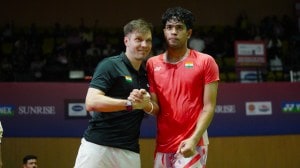Searching for Mr Imperfect (or why Aussies shouldn’t win)
Sheep, they call the Aussies in South Africa. There’s probably a suffix to that word, as Manchester United fans use to describe bitter ...

Sheep, they call the Aussies in South Africa. There’s probably a suffix to that word, as Manchester United fans use to describe bitter rivals Leeds, but sheep will do for now. There is a fair amount of sporting rivalry between the two countries. They’ve had enough occasion to foster it: The two countries are among the best in rugby and cricket and in the second rung of world athletics.
So South Africans have good reason to despise Oz and want them to lose. But there’s another reason why: The Australians have won too much for too long. They are, to use an Americanism, perhaps cricket’s winningest team. Their style of cricket — ruthless, intimidating, aggressive — is based on the simple ethic of hard work, total commitment and team unity.
Which is all very well, but there’s one thing missing from this formula — art. Watching the Australians play cricket, at their best, is great the first time, great the second and third times too. But by the time you’ve seen them play 10 matches, there’s precious little to appreciate other than the meticulous, methodical application of the formula. You can marvel at McGrath’s accuracy, at Gilchrist’s butchering abilities and Hayden’s sheer power, but it’s nothing you haven’t seen them do before. Or won’t see again.
Perfection can be boring. Which is why, increasingly during the course of this world cup, I’ve heard people voice their support for the West Indies. This is not some perverse psychology at work; people — international batsmen of that era excepted — have a genuine fondness for the great teams of the 1970s and 80s. Not because they won matches, but because of the style they won it in. They may have been erratic, unscientific and unpredictable, but boring they were not.
That’s the way we love our heroes: with feet of clay, not heads filled with silicon chips. As artists with the inherent imperfection of a hand-held brush rather than computer designers working with a mouse. That’s why I, and many of my generation, stopped watching tennis after McEnroe, Nastase and Lendl. Pete Sampras was amazing but infallible. He’s actually more fun to watch now, because there’s something he’s up against for the first time: age.
Football has its cycles too. Why does everybody love Brazil? They crash out of tournaments when expected to win (1982), and win when no one gives them a ghost of a chance (2002). Yet they never abandon the one abiding tenet of Brazilian football: forget tactics, just kick the ball around.
So, too, with the great Manchester United team of the 1990s, the one that won all those trophies. They were at their winningest when they attacked, as is the club’s policy from the 1950s. They were unpredictable, too, the only given being that someone would score a winner in the third minute of injury time. They made it hard for themselves, as their manager Alex Ferguson kept saying.
And the Arsenal team of today, aspiring to that same level of greatness, at least have the sense to lose the odd game and keep interest alive.
Which brings us to the reason for this article: the start of the Formula 1 season this weekend. There have been concerns that the sport is losing spectators in droves, facts show that TV ratings dropped last season. This was coincidental with the phenomenal success of Michael Schumacher. Schumi is the winningest driver in recent history — four straight season titles and 15 of 17 races won last year — and word is that the only threat to him this season comes from either blips on the circuit surface or the blips in the car he drives (and how’s that for irony? Machine fails but man is perfect).
Those who run Formula 1 have figured out that it isn’t actually coincidence, that one man winning everything every time has all the romance of sport as does tying one’s shoelaces (though in Australia, where the season starts, they should be used to it). They’ve changed rules — electronic aids and traction controls are out — officially to make the sport cheaper. But you know the real reason: to give others a chance.
Back to Australia. News comes in to offer hope that they could be fallible: Jason Gillespie has suffered an injury, which proves he’s human and opens up a tiny window of opportunity for anyone who isn’t already overawed by the men in yellow (there they go, mocking the world again — why yellow, of all colours?).
Me, I’m backing Ganguly. He’s the classic sporting great: when he’s at the crease, he can be divine or disastrous, winner or loser. That, for me, is the essence of sport. Now, if only he does a bit more of the winning…






- 01
- 02
- 03
- 04
- 05
























